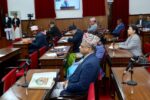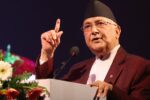WASHINGTON: A new study by clinical psychologist, Emily Kroska at the University of Iowa shows how people might reduce their distress during the coronavirus pandemic.
The study, “Psychological flexibility in the context of COVID-19 adversity: Associations with distress,” was published in the Journal of Contextual Behavioral Science. In that study, Kroska’s research team surveyed Americans’ responses to various situations brought by the coronavirus pandemic.
The team found that those who took stock of their emotions — be the sadness, anxiety, fear, loneliness, and the like — and then addressed those emotions with mindful action–such as calling a friend or family member — reported lower stress levels than those who steered away from identifying with their emotions or did not gauge the potential effects of their behavior.
“The goal is to try and help people become more resilient by remaining in touch with their emotions and finding creative ways to maintain or build upon relationships with people or activities that are important to them,” said Kroska, assistant clinical professor in the UI Department of Psychological and Brain Sciences.
“People who do that will generally not be as distressed, or anxious, as those who don’t,” added Kroska.
The researchers in May surveyed 485 adults across the nation, asking them to describe their experiences with various situations arising from the coronavirus pandemic.
The respondents identified physical sensations such as sweating, accelerated heart rate, and fear for their own safety, as well as “objective hardship measures,” including making rent or mortgage payments, loss of personal income, living apart from family members, or difficulty getting grocery items or household supplies.
“Basically, we wanted to learn about the full sort of adversities that people encountered due to COVID-19,” Kroska says. “We found everyone encountered some degree of adversity, which is quite sad but expected.”
The researchers used those answers to measure a respondent’s “psychological flexibility” or, generally speaking, their ability to roll with the emotional punches inflicted by the pandemic.
The researchers determined respondents’ psychological flexibility based on three factors: Openness, behavioral awareness, and valued action.
Survey respondents who were open to their emotions and were more aware of how they were responding to those emotions were found to have lower levels of pandemic-induced distress. As a whole, psychological flexibility accounted for a substantial proportion of pandemic-induced distress.
Kroska gives the example of turning to Zoom to connect with someone who’s important to you, even if speaking with that person remotely is inferior to conversing face to face.
“If you are creative with trying to talk with your family remotely instead of in person, but you’re resentful about it the whole time and think it sucks, that’s going to cause more distress,” says Kroska. “But if you’re willing to say, ‘OK, this isn’t what we were exactly hoping for, but we’re going to make the best of it,’ that’s the values and the openness piece. It’s the combination that’s required.
“Really what it comes down to is, can you adapt? Can you do what matters even when it’s challenging?” Kroska adds.
Kroska, who counsels patients affected by distress stemming from the pandemic, as well as stress more generally, says it’s natural for people to be anxious.
“People don’t want to be distressed, but they’re going to be during this pandemic,” she said.
“Being flexible and continuing to do what is important to you even during these difficult times is important and is associated with less distress. I think people are desperate for anything that will help them feel less stressed out.”(ANI)









Comment